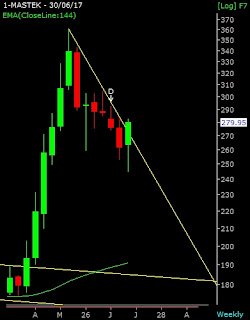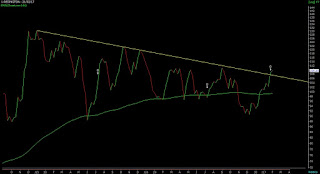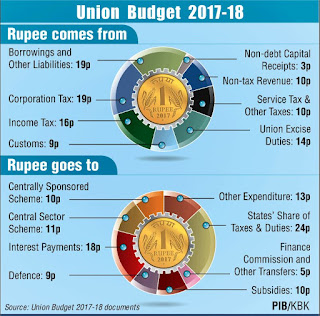Office No. 603, 6th Floor, 765, Fly Edge, S.V. Road, Near Dattapada Bridge, Above Tirumala Showroom, Borivali ( West ), Mumbai - 400 092. . . 7mountainfinancialservices@gmail.com
Wednesday, 20 December 2017
Tuesday, 28 November 2017
Tuesday, 19 September 2017
Tuesday, 22 August 2017
Thursday, 17 August 2017
Important principles of Investing
Revisiting some important principles of Investing:- in lieu of the carnage that happened during the week.
1) 80% of gains come in 20% of time. So an investor needs enormous patience and conviction to hold stocks or Mutual funds for 10 or 20 years.
2) Why not all investors get rich? They like to get rich without going through many years of discipline & patience. Process leads to outcome.
3) An inferior strategy you can stick with is likely to produce better results than a superior strategy you cannot stick with.
4) Prices change frequently. Value change over a period of time. There lies the opportunity.
5) Compounding is back loaded. It works well only over a longer period of time. There is no substitute for time in compounding.
6) 99% of the time, doing nothing is the best thing to do in the market. It is good to be a Rip Van Winkle investor. Activity hurts. Sit still.
7) You cannot predict or control markets. What you can control is how much you save, investment process and behaviour. Focus only on that.
8) Random outcome doesn’t invalidate the need for a process. Sound process and consistently sticking to the same increases the chance of luck.
9) Investors are human. That’s why markets would never be fully efficient.
10) Markets usually run ahead or fall behind. Rarely in equilibrium. Over or under valuation can last for long time. Don’t time the market.
11) Buying and selling is easy. It is holding on through ups and downs is difficult but ultimately most rewarding.
12) Shelby Davis started investing only at age 38 with $50,000. Died at age 85 with $900 million. 23.2% annual return for nearly 5 decades.
13) Shelby Davis is considered the second greatest (5 decades of successful investing is very rare) stock investor after Warren Buffett.
14) Shelby Davis story shows starting late is not a big liability, provided you live long.
15) Tiny drops of water make the mighty ocean. Invest regularly. Invest for long term. You can create huge wealth.
16) Not investing in equity is more risky than investing in it. Remember, you need to beat the inflation and retain your purchasing power.
17) We see past bear markets as missed opportunities. However thinking of future bear markets is gut wrenching. Strange investor psyche.
18) If someone keeps reviewing value of his house every day, we may suspect his mental health. But that’s what we keep doing with our equities.
19) Equity investments are subject to behaviour risks. Always keep a check on our emotions while investing.
1) 80% of gains come in 20% of time. So an investor needs enormous patience and conviction to hold stocks or Mutual funds for 10 or 20 years.
2) Why not all investors get rich? They like to get rich without going through many years of discipline & patience. Process leads to outcome.
3) An inferior strategy you can stick with is likely to produce better results than a superior strategy you cannot stick with.
4) Prices change frequently. Value change over a period of time. There lies the opportunity.
5) Compounding is back loaded. It works well only over a longer period of time. There is no substitute for time in compounding.
6) 99% of the time, doing nothing is the best thing to do in the market. It is good to be a Rip Van Winkle investor. Activity hurts. Sit still.
7) You cannot predict or control markets. What you can control is how much you save, investment process and behaviour. Focus only on that.
8) Random outcome doesn’t invalidate the need for a process. Sound process and consistently sticking to the same increases the chance of luck.
9) Investors are human. That’s why markets would never be fully efficient.
10) Markets usually run ahead or fall behind. Rarely in equilibrium. Over or under valuation can last for long time. Don’t time the market.
11) Buying and selling is easy. It is holding on through ups and downs is difficult but ultimately most rewarding.
12) Shelby Davis started investing only at age 38 with $50,000. Died at age 85 with $900 million. 23.2% annual return for nearly 5 decades.
13) Shelby Davis is considered the second greatest (5 decades of successful investing is very rare) stock investor after Warren Buffett.
14) Shelby Davis story shows starting late is not a big liability, provided you live long.
15) Tiny drops of water make the mighty ocean. Invest regularly. Invest for long term. You can create huge wealth.
16) Not investing in equity is more risky than investing in it. Remember, you need to beat the inflation and retain your purchasing power.
17) We see past bear markets as missed opportunities. However thinking of future bear markets is gut wrenching. Strange investor psyche.
18) If someone keeps reviewing value of his house every day, we may suspect his mental health. But that’s what we keep doing with our equities.
19) Equity investments are subject to behaviour risks. Always keep a check on our emotions while investing.
Sunday, 9 July 2017
!! 20 Investment *Tips* from 20 best *Investors of all time* – that’s T20 !!
~'DIGEST' these...
* *Howard Marks ::*
Smart Investing doesn't consist of buying *Good* Assets, but of buying Assets *'Well'..* This is a very, very important Distinction that very, very few people Understand. "
* *Warren Buffett :::*
"Investors should remember that *Excitement and Expenses* are their Enemies. And if they insist on trying *to 'Time'* their Participation in Equities, they should try to be 'Fearful' when others are Greedy and 'Greedy' only when others are Fearful."
* *John Templeton :::*
"For all long-term Investors, there is only *One Objective* – Maximum total Real Return after Taxes."
* *Benjamin Graham :::*
(Guru Of Buffett)
"It is absurd to think that the general public can ever Make Money out of *'Market Forecasts'..."*
* *George Soros :::*
"If Investing is Entertaining, if you’re having Fun, you’re probably not Making any Money. *Good Investing is 'Boring'.."*
* *Jack Bogle :::*
"If you have trouble imaging a *20% Loss* in the Stock Market, You *Shouldn't* be in Stocks."
* *Bob Farrell :::*
"The Public buys the most at the *Top* and the least at the Bottom." And, "When all the experts and forecasts *agree* – *'Something Else' is going to happen."*
* *Jeremy Grantham :::*
"By far the biggest problem for professionals in Investing is dealing with Career and Business Risk ::: protecting your own job as an agent. The second curse of Professional Investing is Over-Management caused by the need to be seen to be busy, to be earning your keep. The *individual* is far better-positioned to wait patiently for the 'Right Pitch' while paying no regard to what 'Others' are Doing, which is almost impossible for Professionals."
* *Barton Biggs :::*
"Quantitatively based Solutions and Asset Allocation equations invariably *fail* as they are designed to capture what would have worked in the *'Previous Cycle'* whereas the next one remains a *'Riddle' Wrapped in an Enigma."*
* *Philip Fisher :::*
“The Stock Market is filled with individuals *Who know the 'Price' of Everything, but the 'Value' of Nothing.”*
* *Ken Fisher :::*
"You can’t develop a Portfolio Strategy around *endless possibilities.* You wouldn’t even get out of bed if you considered everything that could possibly happen..... You can use *'History'* as one tool for shaping reasonable Probabilities. Then, you look at the world of economic, sentiment and political drivers to determine what’s most likely to happen—While always knowing you can be and will be wrong a lot."
* *Charles Ellis :::*
"The average Long-term experience in investing is never surprising, but the Short-term experience is always Surprising. We now know to focus not on *'Rate of Return'*, but on the *informed Management of Risk"*..
* *Bill Miller :::*
"The Market does reflect the available Information, as the professors tell us. But just as the funhouse Mirrors don't always *accurately reflect* your weight, the Markets don't always accurately 'Reflect' that Information. Usually they are *too Pessimistic* when it's Bad, and *too Optimistic* when it's Good."
* *Thomas Rowe Price Jr :::*
“Every Business is Manmade. It is a result of individuals. It reflects the Personalities and the Business Philosophy of the founders and those who have directed its affairs throughout its existence. If you want to have an Understanding of any Business, it is important to know the *'Background of the People'* who started it and directed its Past and the Hopes and Ambitions of those who are planning its Future.”
* *Carl Icahn :::*
“We have bloated Bureaucracies in Corporate America. The root of the problem is the absence of Real Corporate Democracy.”
* *Peter Lynch :::*
Investing *Without 'Research'* is like playing Stud Poker and never looking at the Cards."
* *John Neff :::*
"It's not always easy to do what's not popular, but that's where you make your money. Buy Stocks that look bad to less careful investors and hang on until their Real Value is Recognized."
* *Henry Kravis :::*
"If you don't have Integrity, you have Nothing. You can't buy it. You can have all the Money in the world, but if you are not a Moral and Ethical Person, you really have nothing."
* *Ray Dalio :::*
"An Economy is simply the Sum of the Transactions that make it up. A transaction is a simple thing. Because there are a lot of them, the economy looks more complex than it really is. If instead of looking at it from the top down, we look at it from the transaction up, it is much easier to Understand."
* *Jesse Livermore :::*
*'Play the Market'* only when all factors are in your favour. No person can play the market all the time and win. There are times when you should be completely *Out Of* the Market, for *Emotional as well as Economic Reasons ...*
~ This is a One Step Closer to
achieve Financial Freedom
Wednesday, 5 July 2017
Friday, 30 June 2017
Tuesday, 20 June 2017
Wednesday, 14 June 2017
Wednesday, 24 May 2017
Monday, 8 May 2017
IMPORTANT DISCLAIMER:
Any Investment in capital markets has its own risks. The information/material sent to you is based on analysis reports, that may or may not be reliable. I do not vouch for the accuracy of the same. This material is for personal information and I am not responsible for any loss/profit incurred based upon it & take no responsibility whatsoever for the same. These messages that i send are meant for educational and knowledge purpose only and not recommendation(s). I AM NOT A SEBI REGISTERED ANALYSTMonday, 17 April 2017
Monday, 20 March 2017
Monday, 6 March 2017
Phil Carret’s “12 Commandments of Investing”
Phil Carret’s “12 Commandments of Investing”:
1. Never hold fewer than 10 different securities covering five different fields of business;
2. At least once every six months, reappraise every security held;
3. Keep at least half the total fund in income producing securities;
4. Consider (dividend) yield the least important factor in analyzing any stock;
5. Be quick to take losses and reluctant to take profits;
6. Never put more than 25% of a given fund into securities about which detailed information is not readily
and regularly available;
7. Avoid inside information as you would the plague;
8. Seek facts diligently, advice never;
9. Ignore mechanical formulas for value in securities;
10. When stocks are high, money rates rising and business prosperous, at least half a given fund should be
placed in short-term bonds;
11. Borrow money sparingly and only when stocks are low, money rates low and falling and business depressed;
12. Set aside a moderate proportion of available funds for the purchase of long-term options on stocks in promising companies whenever available.
Source : http://investing.kuchita.com/2011/05/11/phil-carrets-12-commandments-of-investing/
1. Never hold fewer than 10 different securities covering five different fields of business;
2. At least once every six months, reappraise every security held;
3. Keep at least half the total fund in income producing securities;
4. Consider (dividend) yield the least important factor in analyzing any stock;
5. Be quick to take losses and reluctant to take profits;
6. Never put more than 25% of a given fund into securities about which detailed information is not readily
and regularly available;
7. Avoid inside information as you would the plague;
8. Seek facts diligently, advice never;
9. Ignore mechanical formulas for value in securities;
10. When stocks are high, money rates rising and business prosperous, at least half a given fund should be
placed in short-term bonds;
11. Borrow money sparingly and only when stocks are low, money rates low and falling and business depressed;
12. Set aside a moderate proportion of available funds for the purchase of long-term options on stocks in promising companies whenever available.
Source : http://investing.kuchita.com/2011/05/11/phil-carrets-12-commandments-of-investing/
Monday, 27 February 2017
#Rain Ind Concall - Q4 CY2016
http://corporates.bseindia.com/xml-data/corpfiling/AttachLive/9D63F381_DC2B_4490_88D4_78A02D1C4440_171000.pdf
Wednesday, 22 February 2017
Tuesday, 21 February 2017
Thursday, 9 February 2017
Wednesday, 8 February 2017
Thursday, 2 February 2017
Sunday, 29 January 2017
Wednesday, 25 January 2017
Monday, 23 January 2017
Friday, 20 January 2017
Thursday, 19 January 2017
Wednesday, 18 January 2017
Friday, 13 January 2017
Subscribe to:
Comments (Atom)


























